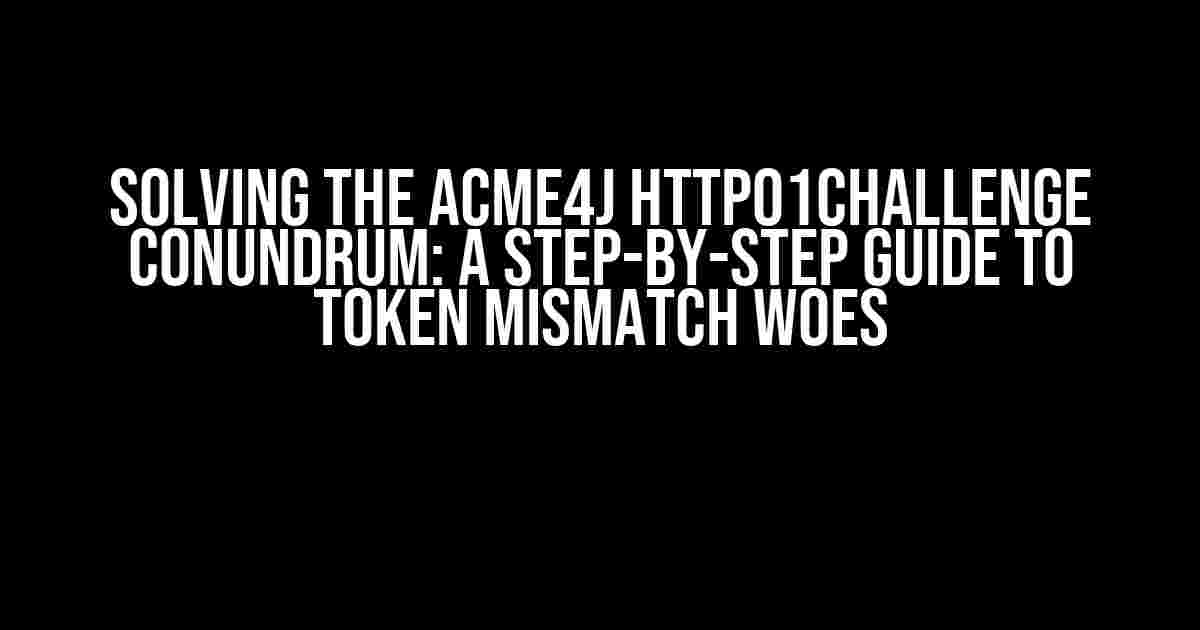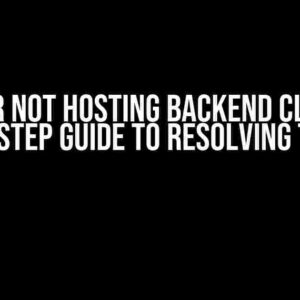Are you tired of facing the dreaded “mismatch of tokens” error after updating your Acme4j Http01Challenge? You’re not alone! Many developers have stumbled upon this hurdle, only to find themselves lost in a sea of confusion. Fear not, dear reader, for we’re about to embark on a journey to conquer this challenge once and for all!
What’s Causing the Token Mismatch?
Before we dive into the solution, let’s understand the root cause of the problem. The Acme4j Http01Challenge relies on tokens to validate domain ownership. When you update your challenge, the tokens are re-generated, which can lead to a mismatch between the old and new tokens. This mismatch is what triggers the error, leaving you scratching your head.
The Anatomy of an Http01Challenge
To better comprehend the solution, let’s break down the Http01Challenge into its constituent parts:
challenge: A unique identifier for the challengetoken: A string used to validate domain ownershipauthorization: A JSON Web Token (JWT) containing the challenge and token
When you update the challenge, the token is re-generated, which in turn updates the authorization JWT. This is where things can go awry.
Step-by-Step Solution to Token Mismatch
Now that we’ve covered the basics, let’s dive into the solution. Follow these steps to resolve the token mismatch issue:
Step 1: Rollback the Update
Roll back the update operation to its previous state. This will ensure that the old token is still valid, and we can work from there.
// Roll back the update operation acmeClient.rollbackUpdate();
Step 2: Retrieve the Old Token
Get the old token from the previous challenge. You can do this by:
// Get the old challenge Challenge oldChallenge = acmeClient.getChallenge(); // Extract the old token String oldToken = oldChallenge.getToken();
Step 3: Update the Authorization JWT
Update the authorization JWT with the new token, while keeping the old token intact. This is crucial, as we need to maintain the token consistency.
// Create a new authorization JWT with the old token Authorization oldAuthorization = new Authorization(oldChallenge, oldToken); // Update the authorization JWT acmeClient.updateAuthorization(oldAuthorization);
Step 4: Re-Trigger the Http01Challenge
Re-trigger the Http01Challenge with the updated authorization JWT. This will ensure that the new token is used for validation.
// Re-trigger the Http01Challenge acmeClient.triggerHttp01Challenge();
Troubleshooting Tips and Tricks
Sometimes, despite following the steps, you might still encounter issues. Fear not, dear reader, for we’ve got some troubleshooting tips to help you out:
- Verify token consistency: Ensure that the old token is used consistently throughout the update process. Any discrepancy can lead to token mismatch errors.
- Check authorization JWT validity: Make sure the authorization JWT is valid and not expired. An invalid JWT can cause token mismatch issues.
- Review update operations: Double-check that the update operation is rolled back correctly, and the old token is retrieved accurately.
Conclusion
And there you have it! By following these steps and troubleshooting tips, you should be able to resolve the token mismatch issue with your Acme4j Http01Challenge. Remember to stay calm, and methodically work through each step. With this comprehensive guide, you’ll be well on your way to conquering the token mismatch conundrum.
Additional Resources
For those who want to dive deeper into the world of Acme4j and Http01Challenge, we’ve included some additional resources:
| Resource | Description |
|---|---|
| Acme4j GitHub Repository | The official GitHub repository for Acme4j, featuring documentation, examples, and issue tracking. |
| RFC 8555: Automatic Certificate Management Environment (ACME) | The official RFC documentation for ACME, providing in-depth information on the protocol and its implementations. |
With this wealth of knowledge, you’ll be equipped to tackle even the most complex Acme4j Http01Challenge issues. Happy coding!
Frequently Asked Question
Get answers to the most frequently asked questions about Acme4j Http01Challenge failing due to mismatch of tokens after update operation.
What is Acme4j Http01Challenge and why is it failing?
Acme4j Http01Challenge is a mechanism used to validate domain ownership during SSL/TLS certificate issuance. It’s failing because the tokens generated during the challenge are not matching after an update operation, resulting in a mismatch error.
What triggers the token mismatch error in Acme4j Http01Challenge?
The token mismatch error is typically triggered when the Acme4j client and the ACME server have different token values or when the token is updated or regenerated during the challenge process.
How can I troubleshoot the token mismatch error in Acme4j Http01Challenge?
To troubleshoot the error, check the Acme4j client and server logs for token values, verify that the token is updated correctly during the challenge, and ensure that the token is not being regenerated unnecessarily.
What are the consequences of Acme4j Http01Challenge failing due to token mismatch?
The failure of Acme4j Http01Challenge due to token mismatch can result in failed SSL/TLS certificate issuance, leading to security risks and potential downtime for your application or website.
How can I prevent token mismatch errors in Acme4j Http01Challenge?
To prevent token mismatch errors, ensure that the Acme4j client and server are properly synchronized, use a reliable token storage mechanism, and implement retry mechanisms to handle temporary token mismatches.


